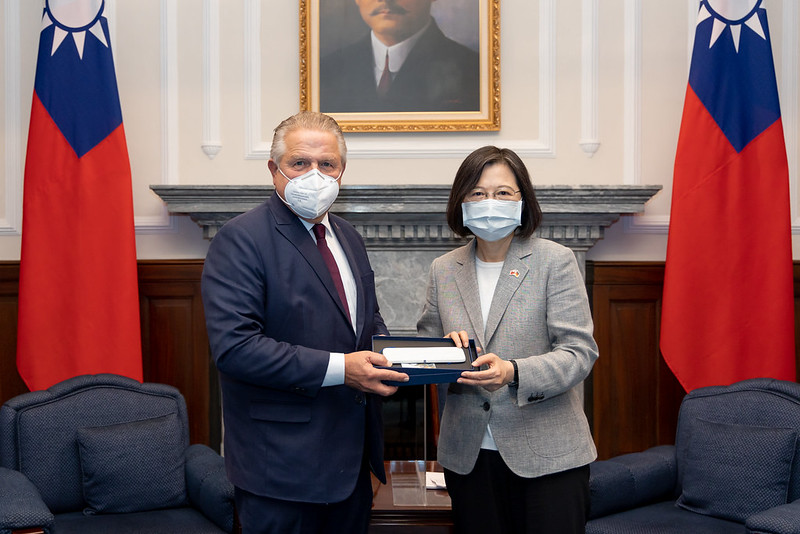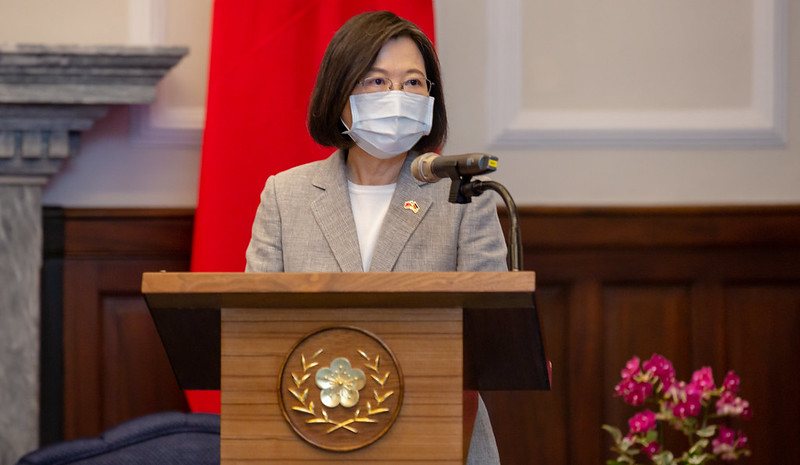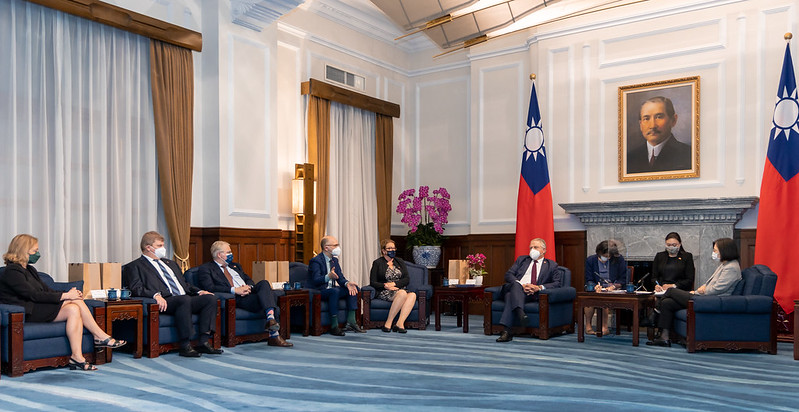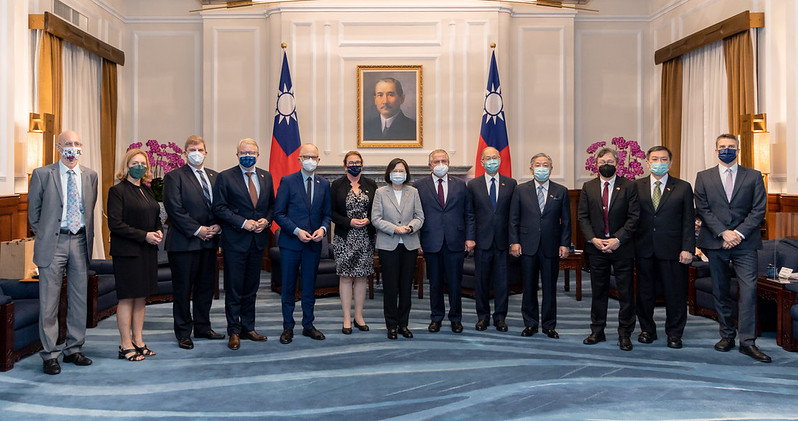News & activities
 News releases
News releases
While meeting on the morning of October 3 with a delegation from the German-Taiwan Parliamentary Friendship Group, President Tsai Ing-wen stated that Taiwan and Germany, beyond being important partners with a shared commitment to democracy and freedom, also have strong ties in such areas as energy transition, financial supervision, and transitional justice. President Tsai called for further solidarity and cooperation among democratic nations in the face of serious global challenges including climate change and authoritarian expansion. We must stand in firm defense of democracy and freedom, she said, as we work together to advance important values such as justice, peace, and environmental sustainability.
In remarks, President Tsai stated that German-Taiwan Parliamentary Friendship Group Chairman Klaus-Peter Willsch has been a friend to Taiwan for many years. The president recalled how Chairman Willsch congratulated her after her re-election as president in 2020 and said that he would visit Taiwan again once border control measures were lifted. President Tsai said she was very pleased to receive a visit at the Presidential Office from Chairman Willsch and his delegation.
Stating that this was the first time a parliamentary group from Germany has visited Taiwan since the pandemic began, President Tsai said the fact that this was a cross-party delegation made the visit especially meaningful, and sincerely welcomed the delegation. The president mentioned that many countries have started to lift border restrictions and said that Taiwan is very much looking forward to resuming exchanges and cooperation with other countries.
President Tsai noted that the German-Taiwan Parliamentary Friendship Group is one of the German Bundestag's biggest bilateral friendship groups, and that the members of this delegation are important supporters of Taiwan in the Bundestag.
President Tsai noted that this year marks the first time that the Bundestag has passed a resolution supporting Taiwan's participation as an observer at the World Health Assembly. In addition, she said, 125 members cross party lines jointly signed a letter to World Health Organization (WHO) Director-General Tedros Adhanom Ghebreyesus expressing their support for Taiwan, which is the first time in many years that more than 100 members of the Bundestag have signed onto a petition.
President Tsai stated that this past August, China conducted long-running military exercises in an attempt to interfere with the existing regional order, and that Germany, which holds the G7 presidency this year, acted quickly through the G7 foreign ministers to issue a joint statement once again strongly emphasizing the importance of maintaining peace in the Taiwan Strait. President Tsai expressed deep gratitude for Germany's firm support on behalf of the people of Taiwan.
The president emphasized that Taiwan and Germany, beyond being important partners with a shared commitment to democracy and freedom, also have strong ties in many different fields. She added that in recent years, Taiwan and Germany have signed very substantial cooperation agreements in such areas as energy transition, financial supervision, and transitional justice.
President Tsai said that despite many major changes in the international landscape in recent times, we continue to stand together in facing serious global challenges such as climate change and authoritarian expansion. And for precisely this reason, she said, it is all the more necessary for democratic nations to work together in resolute defense of democracy and freedom. The president also said that Taiwan hopes to deepen cooperation with Germany in many different fields, as we work together to advance such important values as justice, peace, and environmental sustainability.
Noting that October 3 is German Unity Day, President Tsai congratulated Germany on behalf of the Taiwanese people, and wished for long-lasting friendship between our two countries.
Chairman Willsch then delivered remarks, thanking President Tsai for taking the time to meet so that the delegation can engage in an in-depth exchange of views, and for her best wishes on German Unity Day.
Chairman Willsch said that as a long-term participant in German politics, the unification of Germany has a special significance for him. He and President Tsai have been friends for years, and he recalled the first time they met in 2011 when the president, accompanied by then professor [now Taiwan representative to Germany] Shieh Jhy-wey (謝志偉), visited Berlin. Chairman Willsch said that Taiwan and Germany have much in common, and at the time of her visit to Berlin President Tsai was the opposition party chair and he was a member of the ruling party caucus, while today he is a member of the opposition party caucus, a fact that exemplifies democratic values.
Chairman Willsch expressed that Taiwanese should be proud of Taiwan's democratic development, and that democracy being able to serve its purpose, and especially Taiwan's democratic development, has tremendous significance for Asia. Noting that Taiwan has had economic success while embracing a free and democratic way of life, Chairman Willsch said that Taiwan's economy has been recognized worldwide.
Chairman Willsch also pointed out that Taiwan is an important German trade partner in Asia, noting that in 2020 Taiwan performed excellently in international trade. Notably in terms of digital development, the chairman said that without Taiwan's semiconductor industry, global industry may have faced major problems.
Chairman Willsch said that the delegation is visiting for one week this time, and that the German Bundestag is very supportive of bilateral cooperation, and especially the strengthening of diplomatic ties.
Chairman Willsch said that in Europe, Germany's neighbor is now under severe military attack, and the brave people of Ukraine are defending their country, freedom, and democracy. The chairman stated that in various documents and discussions, the Bundestag has also expressed that if Taiwan is subject to a military threat, it will bravely take a stand and assist and support Taiwan.
Chairman Willsch pointed out that for decades, Germany and Taiwan have maintained strong collaboration including economic cooperation, academic exchanges, and even extensive youth exchanges. The chairman expressed that it is important to encourage youth exchanges, so that young people can understand the true meaning of freedom and democracy.
Chairman Willsch concluded his remarks by affirming that Taiwan is an important friend of Germany, thanked President Tsai once again for making time to meet, and wished our bilateral friendship well.
Included among the members of the delegation were German-Taiwan Parliamentary Friendship Group deputy chairpersons Katrin Budde, Till Steffen, Frank Schäffler, Rainer Kraft, and Caren Lay. The delegation was accompanied to the Office of the President by German Institute Taipei Director General Jörg Polster.












